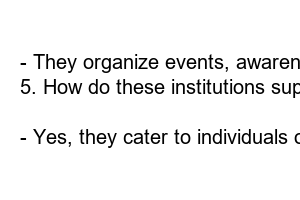장애인활동지원사 교육기관
Title: Empowering Disabled Individuals: The Role of Disabled Activity Supporter Educational Institutions
Introduction:
Disabled individuals often face numerous challenges when it comes to accessing education and participating in activities tailored to their needs. This is where Disabled Activity Supporter Educational Institutions play a crucial role. These institutions provide specialized education, training, and support systems to empower disabled individuals and help them lead inclusive and fulfilling lives.
1. A Comprehensive Approach to Education and Support:
Disabled Activity Supporter Educational Institutions offer a comprehensive approach that goes beyond traditional education. Their programs focus on skill development, adaptive technologies, therapeutic support, and fostering independence.
2. Tailoring Education to Individual Abilities:
Unlike mainstream education, disabled activity supporter institutions understand that each individual has unique abilities and needs. Through personalized education plans, students are able to learn and thrive at their own pace, promoting confidence and growth.
3. Practical Learning for Real-Life Integration:
These institutions prioritize practical learning experiences that empower disabled individuals for real-world integration. With vocational training, job placement programs, and life skills training, students gain the necessary tools to succeed in their chosen fields.
4. Physical and Mental Well-being:
Understanding the importance of holistic development, Disabled Activity Supporter Educational Institutions provide a range of activities and therapies for physical and mental well-being. This includes physiotherapy, counseling services, recreational activities, and access to adaptive sports facilities.
5. Community Integration and Advocacy:
Disabled individuals are often underrepresented in society. Disabled Activity Supporter Educational Institutions actively promote community integration by organizing events, awareness programs, and social initiatives. These institutions work as advocates, challenging stigmas and promoting inclusivity and acceptance.
6. Collaborative Approach:
Collaboration among educators, therapists, parents, and support staff is vital in creating a positive learning environment. Disabled Activity Supporter Educational Institutions encourage open communication and teamwork to ensure the best possible education and support for their students.
7. Continuous Support and Lifelong Learning:
Disabled Activity Supporter Educational Institutions recognize that learning and support should not end after graduation. Alumni are provided with ongoing support, networking opportunities, and resources to navigate the challenges of adulthood, ensuring lifelong learning and growth.
Summary:
Disabled Activity Supporter Educational Institutions offer a remarkable array of programs and support systems that empower disabled individuals to reach their full potential. Through tailor-made education, vocational training, therapy services, and community initiatives, these institutions foster inclusivity, independence, and holistic well-being. By nurturing collaboration and providing continuous support, they ensure a lifetime of learning and growth for disabled individuals.
FAQs:
1. How do Disabled Activity Supporter Educational Institutions cater to different disabilities?
– These institutions create individualized education plans and utilize adaptive technologies to meet the specific needs of each disability.
2. Do these institutions provide job placement assistance?
– Yes, they offer vocational training and job placement programs to enhance employment opportunities for disabled individuals.
3. Are supportive therapies available at Disabled Activity Supporter Educational Institutions?
– Yes, they provide a range of therapies, including physiotherapy, occupational therapy, and counseling services.
4. How can these institutions promote community integration?
– They organize events, awareness programs, and social initiatives to challenge stigmas and promote inclusivity.
5. How do these institutions support students after graduation?
– Alumni receive ongoing support, networking opportunities, and resources to navigate the challenges of adult life.
6. Are these institutions for individuals of all age groups?
– Yes, they cater to individuals of all age groups, focusing on lifelong learning and growth.

